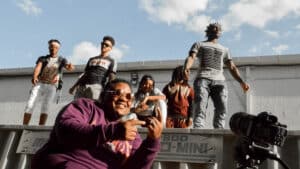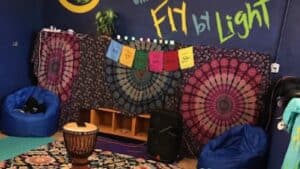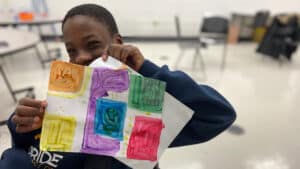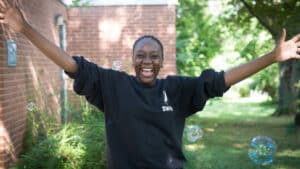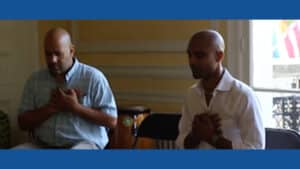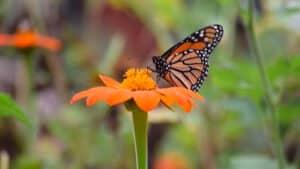STORY #14: Training the Trainers

Hawah Kasat, the Co-Founder / Executive Director at One Common Unity (OCU), has dedicated his life to facilitate interactive workshops, perform, and teach peace. He also leads special trainings for teachers and students in conflict resolution, non-violent communication, positive youth development, social-emotional literacy, mindfulness, social justice, and arts empowerment.
“Training the Trainers”
One Common Unity offers professional development in Peace Education, Social-Emotional Literacy, Mindfulness, and Trauma-Informed Care to educators, administrators, therapists, community organizers, and youth workers who desire to take their skills to the next level. The training provides additional tools for incorporating diversity, equity, and inclusion into a framework of empowerment and creating trauma-informed classrooms and schools. This dynamic training is known as the Fly By Light National Training.

Creating fertile ground for growth
This program is important because our schools need support in responding to the shifting dynamics of the classroom and the needs of a rapidly changing world. Outdated and culturally insensitive pedagogical methods can no longer be employed if we want to foster emotionally healthy, vibrant, and successful youth of the future. We can increase the capacity for our youth programs to be successful by taking the time to sharpen our skills together. This is important because when you get people in the same room to share with one another, it becomes obvious what works and what doesn’t—this then creates a fertile ground for growth.
The first step to healing
One of the challenges our community is facing right now is trying to maintain a culture of positive mental health during this time of multiple crises. There is so much stress and pressure being placed upon individuals undergoing serious economic challenges, job insecurity, and other anxieties which can lead to depressive, negative thought patterns, and sometimes violent episodes. There’s a huge need for us to support those that are being challenged in so many unimaginable ways, especially considering the fact that Washington, DC’s violence and the crime rate is almost 6 times higher than the national average and our DC youth are four times more likely to die by homicide than by the next closest cause. That’s why OCU aims to find innovative holistic ways to engage the mind-body connection in order to understand the various and vast social-emotional needs of our youth.
Understanding and addressing the core problems of our students is what can lead them to become healthy and successful, which will ultimately spill over into higher academic achievement. We cannot expect academic achievement without social-emotional literacy and support. Moreover, racism within the United States has a huge psychological and emotional impact on Black and Brown people across the country, which is why as educators we must learn how to teach with a trauma-informed lens.
Together we can rebuild, restore, and transform community spaces so that marginalized people don’t continue to feel ostracized. This is the first step to healing.

The Training
Our Fly By Light National Training has a very unique and interactive approach. Combined, our program facilitators have over 50 years of experience. Our facilitators have tried, tested, and transformed our program so that it is culturally sensitive and relevant. The training not only provides skills for those we are certifying, but it also creates a space for their personal-emotional growth where they can begin to integrate mindfulness and self-care practices into their lives. One of the biggest takeaways we hope trainees learn is that we must be diligent to ensure that we do not bring our own traumas into the classrooms or into any spaces where we are working with youth.
Creating a national movement
Since 2000, OCU has been bridging communities together throughout Washington, DC, and other parts of the country. We had originally created the training program for our facilitators in Washington, DC, but we quickly realized these lessons could be of great use to people everywhere, and so we introduced our work to those outside DC and gave them the tools needed to start their own FBL chapters. Similarly, after we carefully crafted our 190-page curriculum, we knew we had to share it with the rest of the world. In general, teacher-training programs across the country need to be reimagined; which is exactly the conversation we seek to elevate through our National Training Program. By continuing to extend our program outside of DC, we are impacting, supporting, shaping, inspiring, and building momentum for this important educational movement.
We started locally but dream globally.
Taking a virtual approach
Our 2019 National Training was beautiful because people came from all around the world to participate in the program. It was a magical feeling being able to come together and start our days with meditation, drumming, and sound circles.
Unfortunately, when the pandemic hit, we had to pivot the entire National Training to a virtual space. In the summer of 2020, we did the entire 40-hour training program online and we plan to do the same again this summer of 2021. Luckily though, we’ve been able to adapt our curriculum to the virtual environment. Although it’s a different dynamic virtually, it’s still a very powerful experience. We might not be in the same room physically, but we still bond with the participants and make genuine commitments to the work at hand, together.

Setting our sights on the future
The hope is that over time, educators will feel more empowered to help students work through what’s in front of them so that they can be academic achievers. We need to see violence decrease in our communities and we hope to see more young people using arts and music and other creative methods to advocate for social change. We also hope that the youth and their families begin to integrate more sustainable practices into their lifestyles by enhancing their interpersonal relationships and showing up for each other when it matters most. Likewise, we also hope that those taking part in our training will realize a sense of joy and happiness by helping improve their own mental health and introducing them to wholesome self-care techniques.
As OCU celebrates its 20 year anniversary, we look forward to more and more people taking part in our programs. By creating a regional and national network of youth leaders that represent our program, we dream of seeing more Fly By Light chapters and program sites across the country.
~ HAWAH

